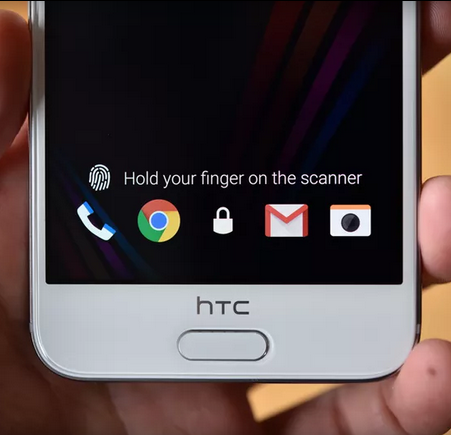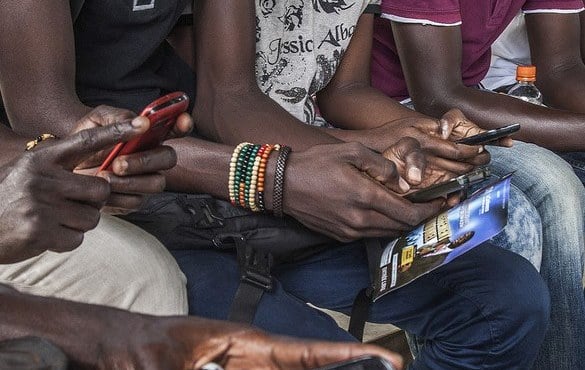Fingerprint scanners driving the biometrics industry, IoT projects driving mobile devs, VR revenue set to pass $1bn, and the 4 bn unconnected.
These and many more mobile related data points and reports in this week’s MEF market stats round up…

Fingerprint scanners to drive biometrics industry to $1.8bn
The global biometric sensor market is set to grow from $710 million in 2014 to $1.8 billion by 2023, says a new report by Transparency Market Research. That represents a 9.6 per cent annualised increase.
TMR highlights three major factors driving the market: rising interest from enterprise customers (especially in access), growing use of fingerprint and facial recognition tech in consumer electronics; and more applications in automotive.
The report says fingerprint scanning and facial recognition together comprised 56 per cent of total revenue in the market in 2014.
Read more…
4.5 million developers are working on IoT projects
The Internet of Things looks set to be the next big employer of mobile developers, says a new study by Vision Mobile.
It reports there were 4.5 million IoT developers in the world at the end of 2015, and that this will grow to 9.7 million by 2020.
However, they’re not exactly earning a fortune doing it. Vision Mobile says 57 per cent of IoT developers are ‘hobbyists and explorers’ earning under $500 per month from their activities.
Read more…
VR revenues set to pass $1 billion for the first time
Sales of 2.5 million VR headsets and 10 million compatible games will propel the VR market to its first billion dollar year in 2016, says the 15th edition Deloitte’s annual tech predictions.
It reckons VR will have a breakthrough 12 months, though the activity will still be driven by early adopters. So while anyone with a smartphone can try a variant of VR, the majority of VR’s revenues in 2016 will be driven by tens of millions of users rather than billions.
This is one of many VR-based predictions to have made the headlines this year. With all the big hardware releases now imminent (Oculus, Valve etc), market watchers are keen to share their observations.
But there’s not much consensus. Last week, Superheat Research said consumers will spend $5.1 billion on VR hardware and software this year. That will equate to 56 million devices in the market.
Read more…
Four billion people still do not have access to the Internet
A major new report by the World Bank says ‘closing the digital divide should be a global priority to generate growth, jobs, and improve services’.
Its 2016 World Development Report concedes that there has been a huge rise is digital connectivity over the last two decades, but says the spoils of this are not being shared.
So, while there are now 3.2 billion Internet users worldide, there are still nearly four billion — 60 per cent of the world population – offline. Meanwhile, two billion people do not have a phone. And almost half a billion people live outside areas with a mobile signal.
Deepak Mishra, a World Bank economist and one of the co-directors of the report, said: “We share the optimism of Silicon Valley when it comes to the transformative potential of digital technologies. But not the expedient view that the benefits are both assured and automatic,”
Read more…
WhatsApp closing in on its one billionth user
An interview on Wired reveals that the chat app WhatsApp has attracted 990 million users.
The article says that makes it the second-most popular app on Earth (not including pre-loaded iOS and Android apps) after Facebook. And, of course, WhatsApp was bought by Facebook for $19 billion in February 2014.
The challenge now is to turn those users into revenue. Now that WhatsApp has reached (almost) a billion people, it’s ready to explore new ways of making money. Pre-acquisition, the firm had a simple model. It charged users $1 a year. But now, it’s dropping the fee.
Perhaps the most likely route is finding a way to charge the many business users that communicate using the app to pay up. WhatsApp’s CEO Jan Koum gave Wired the example of a restaurant using WhatsApp message for reservations.
Read more…
Windows 10 Mobile is running on one million phones
Microsoft launched its OS Windows 10 bounded last 29 July 2015 as part of a major new direction for its core platform. A version for phones emerged in November, with new features such as Continuum and Universal Windows apps.
Microsoft’s main push with Windows 10 was to make all devices interconnect. So, for example, Universal apps look the same on any device and and sync across mobile and desktop instantly.
Now, in a ZDNet podcast, Microsoft has revealed that Windows 10 is on 200 million devices. That’s 180 million PCs, 18 million Xbox One consoles and over one million Windows 10 Mobile devices.
One million is a low figure, but the OS has not really had an official rollout. Microsoft originally slated the release of the Windows 10 Mobile update for December 2015, but this has since been pushed back, and should be confirmed in the next few weeks.










